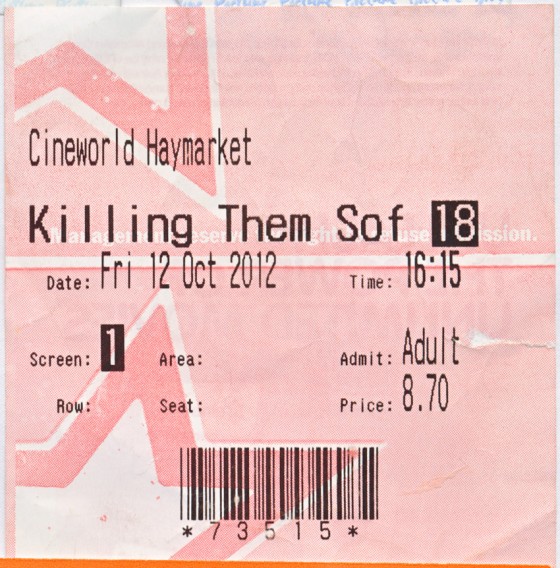Killing Them Softly

Seeing movies with other people.
There has been a lot of confusion over Killing Them Softly, which is nevertheless one of the best films of 2012. As usual, I will speak briefly about the 99% of it that was fantastic, and excessively of the 1% that I found mildly objectionable. It should bear mentioning that Killing Them Softly is probably a movie I’ll see again sooner, and more often than Flight, a film I liked more. Now that I’ve confessed to not liking better films as much as good ones, I’m not sure what this preordains, other than a slow descent into become an Oscar voter. Worst yet, a Oscar voter wannabe.
At least I'm the kind of hypocrite that is totally honest about everything he does.
Flight is terrific, nearly perfect, but it doesn’t have the requirement of repeatability, at least in the near term. When I re-did this site, there was going to be an elaborate formula instead the much better and realistic dollar value that you see today. For this alternate reality, I would calculate how many times I would see it, over what period, divided by tropes and so on. In other words real science (this is what real scientists call ‘super science’). Thus, you would be reading this piece now and saying ‘I can’t believe he gave Killing Them Softly a .39293030 and Flight a .3829403. Did he forget to carry the 2?‘. From the man who brought you Treasure Island, an indecipherable rating system. But less scientific heads prevailed, and so you’re just going to have to call me a hypocrite. LoveFilm queue depending, I’ll be seeing Killing Them Softly sooner than the films I liked more, like Week-End or We Need To Talk About Kevin. At least I’m a hypocrite that is totally honest about everything he does.
Again with choice and narrative and so on, but what this film has, from the opening scene, is the irrational believable choice. Our erstwhile Squirrel begins by saying that he doesn’t trust the mope who’s lined up for the heist, and then tells a story in great detail, how the last time he didn’t follow his gut, he wound up in jail. A pause, and then so here’s the plan. It’s believable and funny, and gives us a glimpse into that part of character, that we’d risk jail or getting shot just to be able to say show somebody, even a mope, especially a mope, how smart we are.

Another credit to its repeatability is the dialog, which is the verbal equivalent of an action scene. The juxtapositions and observations that would produce ‘There’s no piece of ass like a young Jewish girl that’s hooking’, conjure any number of great lines that come so fast and furious that I have forgotten them, and need to refresh. Hence, see again-ness. And, with the believable irrationally above, this bit is delivered by Mr. James Gandolfini in the matter of utter belief; not shame, but that he is trying, despite Mr. Pitt’s incredulity, to impart great wisdom, goddammit.
But now to the confusion, and the sneaky critique, which looks like will only be 50% of this piece after all, and only 50% critique. Actually what it really looks like is 1%, but that’s because I haven’t written it, and it’s all blank page. The blank page! I’m a writer! I should write about how hard it is to write!
Sigh.

Okay, this is a great theater. They show art movies, and screen 1 is a huge, and utterly untouched deco-age palace. Only theater 1. What you do (and I can’t believe Richard thought of this before I did) is start the process of buying tickets online to see which film is playing in which theater. London specifically, and England in general, is not the best for the movie experience. This is the exceptions. Also we had macarons from Ladurée. Not the worst day of all time.
Anyway, not totally true, and speaking of the honest hypocrite, let’s jump into a bit I’ve already written. Once upon a time, there were two Russian silent film directors: G-n Sergei Eisenstein, G-n V.I. Pudovkin (I’ve gone way over the top with this damned formal means of address, but I can’t stop now; on one hand it would be rude not to, on the other, using the honorific makes me even more of a jerk. Hey, that’s the same hand!). Invoking these names, whose films I would only have seen, and did see, as part of a college course, is like leaving the non-textbooks on your shelves of Goffman and Plath. For shame!
Whatever the origin, G-n Pudovkin is the better filmmaker (which I would say because you’ve never heard of him, but it might also be true) for reasons that he was able to integrate the metaphor into the story, which G-n Eisenstein was not. Weirdly they made the same movie way back in the 1920s, Konets Sankt-Peterburga and Bronenosets Potyomkin (It’s Battleship Potemkin for Christ’s sake – come on, if I’m using honorifics, original titles is par for the course. I could have used the cyrillic, so Закрой пасть). You never seen either one, and neither would have I, but you can at least pretend that you’ve seen the latter if you were at a party. Discussing Russian silent films.
Anyway, they both use the kind of metaphors that critics love: G-n Eisenstein has a statue of a lion stand up in editing (three different lions cut together) to represent the revolution, I don’t know, standing up, I guess. G-n Pudovkin, on the other hand, has this kind of weird mechanical peacock that finally winds down as the Kerensky government does. They’re both kind of clunky, especially now that I’m forced to describe them, but G-n Pudovkin’s has a chance of working because it’s part of the story, and not just patched in.
What people can’t stand about Killing Them Softly are the directorial touches, and this is fair enough, since some of them are pretty distracting. My friend Richard liked the hard sound cuts at the beginning; I found them Eisensteiny. Most people hated the Bush-Obama debates playing in the background, but, as it fits with the theme and the time of the film, I loved it. They weren’t too on the nose (as they would be with a film about war being bad and so forth), and they created an environment in a way that’s rare in films.
Did Mr. Andrew Dominik try too hard? Probably. But two things: 1) consider the alternative, as we are forced to do with every lazy film we see, and 2) how good the actors are in the scenes where not much happens, which is, please remember, what a director is supposed to do. One of my favorites scenes of all time in any film is Mr. Tyrone Power in Nightmare Alley, as he tries to convince his girlfriend to go on the run with him. He switches from begging, to threats, to sympathy in the blink of an eye, and with utter credulity. Mr. Brad Pitt has the same task when he has to convince one of the robbers to give up Squirrel, and switches between rational choice, to murder, to shame and just as seamlessly. The fact that the critics didn’t notice this, and didn’t notice that they didn’t notice, is the testament.
And that last line, which is so good, I’m not even going to spoil it here. And I’m me, so think about that.
The Take

$17.00
The Lonely Comments Section

 [logo]
[logo]
